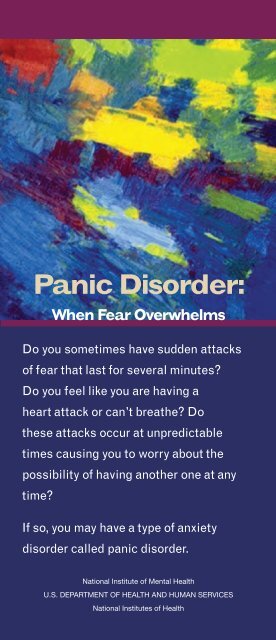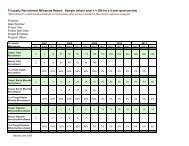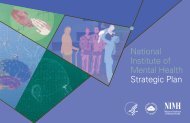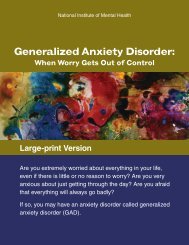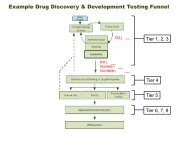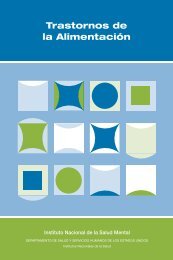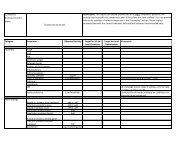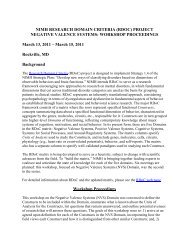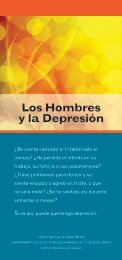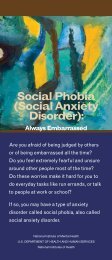Panic Disorder: When Fear Overwhelms - NIMH - National Institutes ...
Panic Disorder: When Fear Overwhelms - NIMH - National Institutes ...
Panic Disorder: When Fear Overwhelms - NIMH - National Institutes ...
Create successful ePaper yourself
Turn your PDF publications into a flip-book with our unique Google optimized e-Paper software.
<strong>Panic</strong> <strong>Disorder</strong>:<br />
<strong>When</strong> <strong>Fear</strong> <strong>Overwhelms</strong><br />
Do you sometimes have sudden attacks<br />
of fear that last for several minutes?<br />
Do you feel like you are having a<br />
heart attack or can’t breathe? Do<br />
these attacks occur at unpredictable<br />
times causing you to worry about the<br />
possibility of having another one at any<br />
time?<br />
If so, you may have a type of anxiety<br />
disorder called panic disorder.<br />
national institute of mental Health <br />
U.S. Department of HealtH anD HUman ServiceS <br />
national institutes of Health
<strong>Panic</strong> <strong>Disorder</strong><br />
What is panic disorder?<br />
People with panic disorder have sudden and repeated<br />
attacks of fear that last for several minutes. Sometimes<br />
symptoms may last longer.These are called panic<br />
attacks. <strong>Panic</strong> attacks are characterized by a fear of<br />
disaster or of losing control even when there is no<br />
real danger.A person may also have a strong physical<br />
reaction during a panic attack. It may feel like having<br />
a heart attack. <strong>Panic</strong> attacks can occur at any time,<br />
and many people with panic disorder worry about<br />
and dread the possibility of having another attack.<br />
A person with panic disorder may become<br />
discouraged and feel ashamed because he or she<br />
cannot carry out normal routines like going to the<br />
grocery store or driving. Having panic disorder can<br />
also interfere with school or work.<br />
<strong>Panic</strong> disorder often begins in the late teens or early<br />
adulthood. More women than men have panic<br />
disorder. But not everyone who experiences panic<br />
attacks will develop panic disorder.<br />
What are the signs and symptoms<br />
of panic disorder?<br />
People with panic disorder may have:<br />
• <br />
• <br />
• <br />
• <br />
• <br />
Sudden and repeated attacks of fear<br />
A feeling of being out of control during a panic<br />
attack<br />
An intense worry about when the next attack will<br />
happen<br />
A fear or avoidance of places where panic attacks<br />
have occurred in the past<br />
Physical symptoms during an attack, such as a<br />
pounding or racing heart, sweating, breathing<br />
problems, weakness or dizziness, feeling hot or a<br />
cold chill, tingly or numb hands, chest pain, or<br />
stomach pain.
What causes panic disorder?<br />
<strong>Panic</strong> disorder sometimes runs in families, but<br />
no one knows for sure why some people have it,<br />
while others don’t. Researchers have found that<br />
several parts of the brain are involved in fear and<br />
anxiety. By learning more about fear and anxiety<br />
in the brain, scientists may be able to create better<br />
treatments. Researchers are also looking for ways in<br />
which stress and environmental factors may play a<br />
role.<br />
How is panic disorder treated?<br />
First, talk to your doctor about your symptoms.<br />
Your doctor should do an exam to make sure<br />
that another physical problem isn’t causing the<br />
symptoms.The doctor may refer you to a mental<br />
health specialist.<br />
<strong>Panic</strong> disorder is generally treated with<br />
psychotherapy, medication, or both.<br />
Psychotherapy. A type of psychotherapy called<br />
cognitive behavior therapy is especially useful<br />
for treating panic disorder. It teaches a person<br />
diferent ways of thinking, behaving, and reacting to<br />
situations that help him or her feel less anxious and<br />
fearful.
Medication. Doctors also may prescribe<br />
medication to help treat panic disorder.The<br />
most commonly prescribed medications for<br />
panic disorder are anti-anxiety medications and<br />
antidepressants.Anti-anxiety medications are<br />
powerful and there are diferent types. Many types<br />
begin working right away, but they generally<br />
should not be taken for long periods.<br />
Antidepressants are used to treat depression, but<br />
they also are helpful for panic disorder.They<br />
may take several weeks to start working. Some<br />
of these medications may cause side efects such<br />
as headache, nausea, or difculty sleeping.These<br />
side efects are usually not a problem for most<br />
people, especially if the dose starts of low and is<br />
increased slowly over time. Talk to your doctor<br />
about any side effects you may have.<br />
It’s important to know that although antidepressants<br />
can be safe and efective for many people,<br />
they may be risky for some, especially children,<br />
teens, and young adults.A “black box”—the most<br />
serious type of warning that a prescription drug<br />
can have—has been added to the labels of antidepressant<br />
medications.These labels warn people<br />
that antidepressants may cause some people to<br />
have suicidal thoughts or make suicide attempts.<br />
Anyone taking antidepressants should be monitored<br />
closely, especially when they frst start treatment<br />
with medications.
Another type of medication called beta-blockers<br />
can help control some of the physical symptoms of<br />
panic disorder such as excessive sweating, a pounding<br />
heart, or dizziness.Although beta blockers are not<br />
commonly prescribed, they may be helpful in certain<br />
situations that bring on a panic attack.<br />
Some people do better with cognitive behavior<br />
therapy, while others do better with medication. Still<br />
others do best with a combination of the two.Talk<br />
with your doctor about the best treatment for you.<br />
What is it like to have panic<br />
disorder? <br />
“One day, without any warning or reason, I felt<br />
terrifed. I was so afraid, I thought I was going<br />
to die. My heart was pounding and my head<br />
was spinning. I would get these feelings every<br />
couple of weeks. I thought I was losing my<br />
mind.”<br />
“The more attacks I had, the more afraid I got.<br />
I was always living in fear. I didn’t know when I<br />
might have another attack. I became so afraid<br />
that I didn’t want to leave my house.”<br />
“My friend saw how afraid I was and told me<br />
to call my doctor for help. My doctor told me<br />
I was physically healthy but that I have panic<br />
disorder. My doctor gave me medicine that<br />
helps me feel less afraid. I’ve also been working<br />
with a counselor learning ways to cope with my<br />
fear. I had to work hard, but after a few months<br />
of medicine and therapy, I’m starting to feel<br />
like myself again.”
Contact us to fnd out more about <strong>Panic</strong> <strong>Disorder</strong>.<br />
<strong>National</strong> Institute of Mental Health<br />
Science Writing, Press & Dissemination Branch<br />
6001 Executive Boulevard<br />
Room 8184, MSC 9663<br />
Bethesda, MD 20892-9663<br />
Phone: 301-443-4513 or<br />
1-866-615-<strong>NIMH</strong> (6464) toll-free<br />
TTY: 301-443-8431 or<br />
1-866-415-8051 toll-free<br />
E-mail: nimhinfo@nih.gov<br />
Website: www.nimh.nih.gov<br />
U.S. Department of HealtH anD HUman ServiceS<br />
national institutes of Health<br />
niH publication no. tr 10-4679<br />
revised 2010


